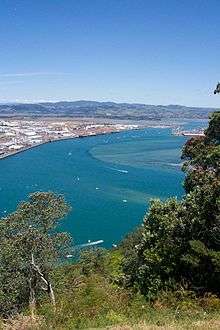List of English words of Māori origin
The following Māori words exist as loanwords in English. Many of them concern endemic New Zealand flora and fauna that were known prior to the arrival of Europeans in New Zealand. Other terms relate to Māori customs. All of these words are commonly encountered in New Zealand English, and several (such as kiwi) are widely used across other varieties of English, and in other languages. In general, words that are written with macrons in Māori are written without macrons in New Zealand English, though the macron is becoming more widely used in New Zealand English.
Flora and fauna
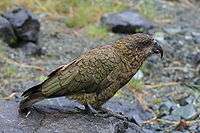
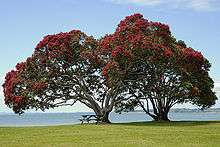
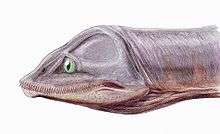
The accepted English common names of a number of species of animal and plant endemic to New Zealand are simply their Māori names or a close equivalent:
- huhu
- a type of large beetle
- huia
- a recently extinct bird, much prized traditionally by Māori for its feathers
- kākā
- a native parrot
- kākāpō
- a rare native bird
- kahikatea
- a type of large tree
- Kaiwhekea
- a type of prehistoric plesiosaur
- katipo
- a venomous native spider
- kauri
- large conifer in the Araucariaceae
- kea
- a parrot, the world's only alpine parrot
- kererū
- the native wood pigeon
- kina
- the sea-urchin, eaten as a delicacy
- kiwi
- the bird, a New Zealander, or (but not in New Zealand English) kiwi fruit
- kōkako
- a rare type of bird
- kowhai
- a type of flowering tree
- kūmara
- sweet potato
- mako
- a shark, considered a magnificent fighting game fish
- mamaku
- a type of large tree fern
- moa
- extinct giant flightless bird
- pāua
- abalone
- pōhutukawa
- a type of flowering tree
- ponga (also spelt punga)
- the silver fern, often used as a symbol for New Zealand
- pukeko
- a wading bird, the purple swamphen
- rātā
- a type of flowering tree
- rimu
- a tree, the red pine
- takahē
- a rare wading bird
- toheroa
- a shellfish
- tōtara
- an evergreen tree
- tuatara
- rare lizard-like reptile, not closely related to any other living species
- tui
- the parsonbird
- weka
- a flightless bird of the rail family
- weta
- a large native insect, similar to a cricket
- whekī
- a type of tree fern
Placenames
Thousands of Māori placenames (with or without anglicisation) are now official in New Zealand. These include:
- Territorial authorities: Waikato, Manawatu, Tauranga, Taranaki, Otago[1]
- Cities: Tauranga, Whangarei, Waitakere, Timaru, Rotorua
- Tourist destinations: Aoraki/Mount Cook, Tongariro, Manapouri, Moeraki, Wakatipu, Te Anau, Waitomo
There is a movement to replace anglicised words and return placenames to their original Māori forms. See for example Whanganui. Some Treaty of Waitangi settlements have included placename changes.
Many New Zealand rivers and lakes have Māori names; these names predominantly use the prefixes wai- (water) and roto- (lake) respectively. Examples include the Waikato, Waipa and Waimakariri rivers, and lakes Rotorua, Rotomahana and Rotoiti.
A Māori name for New Zealand, Aotearoa, has gained some currency as a more acceptable alternative. It appears in the names of some political parties, e.g. Green Party of Aotearoa New Zealand and Communist Party of Aotearoa.
Other words and phrases
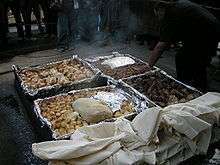
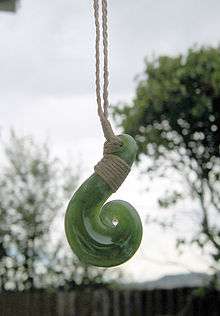
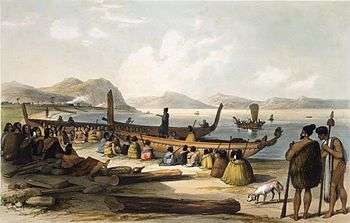
- aroha
- love, sympathy, compassion
- arohanui
- "lots of love", commonly as a valediction[2][3]
- haere mai and haere ra
- welcome and goodbye (respectively)
- haka
- traditional Māori dance, not always a war-dance, often performed by New Zealand sports teams to 'intimidate' opponents; see Haka of the All Blacks
- hāngi
- (1) earth oven used to cook large quantities of food (2) the food cooked in the hāngi
- hapū
- clan or subtribe, part of an iwi
- hikoi
- march or walk, especially a symbolic walk such as a protest march
- hongi
- traditional Māori greeting featuring the pressing together of noses and sharing of breath
- hui
- meeting, conference
- iwi
- tribe
- kai
- food[4]
- kai moana
- sea food
- kapa haka
- a cultural festival or music and dance
- ka pai
- very pleasant, good, fine
- karakia
- sung prayer or welcome
- kaupapa
- policy or principle, credo
- kāwanatanga
- sovereignty
- kia kaha
- an expression of support, lit. be strong
- kia ora
- a greeting, lit. be healthy
- koha
- gift, present, offering, donation, contribution[5]
- kōhanga reo
- Māori language preschool (literally 'language nest')
- kōrero
- to talk; to speak Māori; story
- koru
- stylised fern frond pattern, used in art
- Kura Kaupapa Māori
- Maori language school
- mahinga mātaitai
- traditional seafood gathering place
- mana
- regard in which someone is held; respect of their authority; reputation[6]
- manaia
- guardian spirit, often found in Māori artwork and carving
- Māoritanga
- Māori culture, traditions, and way of life, lit. Māoriness
- marae
- a communal or sacred place that serves religious and social purposes in Māori society
- Matariki
- midwinter festival, the Māori new year, lit. the star cluster of the Pleiades
- mihi
- lit. greet, acknowledge; sometimes used for internet board or forum message
- moko
- facial tattoo
- mokopuna
- descendants, young children. Lit. grandchildren
- Ngaire
- woman's name, origin unknown
- pā
- hill fort
- pakarū
- broken, not working; often rendered in New Zealand English as puckeroo or puckerooed
- Pākehā
- New Zealander of non-Māori descent, usually European
- Papakāinga
- land used as housing by a hapu or whanau group
- poi
- A dance art that originated in Māori culture and is now popular in object-manipulation communities
- pounamu
- greenstone, jade, nephrite
- pōwhiri
- ceremony of welcome[7]
- puku
- abdomen, tummy
- rāhui
- a ban or prohibition
- rohe
- homeland, tribal area
- tangata whenua
- home tribe of a given marae or district; by extension, Māori in the New Zealand context, people of the land.[8]
- taniwha
- mythical water monster
- tangi
- funeral, rites for the dead
- taonga
- sacred treasure. Māori usage: property, goods, possessions, effects, treasure, something prized. The term whare taonga ("treasure house") is used in the Māori names of museums
- tapu
- sacred, taboo; to be avoided because of this; (a cognate of the Tongan tabu, origin of the English borrowing of taboo)
- te reo
- the Māori language (literally, 'the language')
- tiki
- stylised representation of a male human, found in Māori artwork and carving
- tino rangatiratanga
- a political term, sometimes translated as "chieftainship"
- tukutuku
- traditional woven panels
- utu
- revenge. Māori usage: revenge, cost, price, wage, fee, payment, salary, reciprocity
- wāhi tapu
- sacred site
- wai
- water (found at the start of the names of many New Zealand rivers)
- waiata
- singing, song
- waka
- canoe
- whakapapa
- ancestry, heritage
- whānau
- extended family or community of related families[9]
- whare
- house, building
See also
| For a list of words relating to Maori language origins, see the Maori derivations category of words in Wiktionary, the free dictionary. |
References
- ↑ The name "Otago", and several other placenames in the southern South Island have names from a southern dialect of Māori, and thus these names are not in keeping with standard Māori spelling. Other names of this type include Lake Waihola and Wangaloa.
- ↑ 'Merry Christmas, Happy New Year, and Farewell from Ambassador McCormick", US Embassy
- ↑ 'Arohanui Howard Morrison, New Zealand Woman's Weekly
- ↑ "Kiwis say ka pai to pie kai". The New Zealand Herald. 3 October 2010. Retrieved 19 October 2011.
- ↑ Benson, Nigel (2 April 2009). "Festival goes glam today". Otago Daily Times. Retrieved 19 October 2011.
There is also a 2pm matinee today. Entry is by koha
- ↑ "Rugby: Fitzy gracious as record set to fall". Otago Daily Times. NZPA. 12 November 2010. Retrieved 19 October 2011.
- ↑ Constantine, Ellie (18 February 2009). "New commander for district". Otago Daily Times. Retrieved 19 October 2011.
- ↑ Conway, Glenn (7 March 2008). "Local Maori excited about fishing reserve decision". Otago Daily Times. Retrieved 19 October 2011.
- ↑ Fox, Rebecca (26 April 2008). "Whanau given POW journal". Otago Daily Times. Retrieved 19 October 2011.
